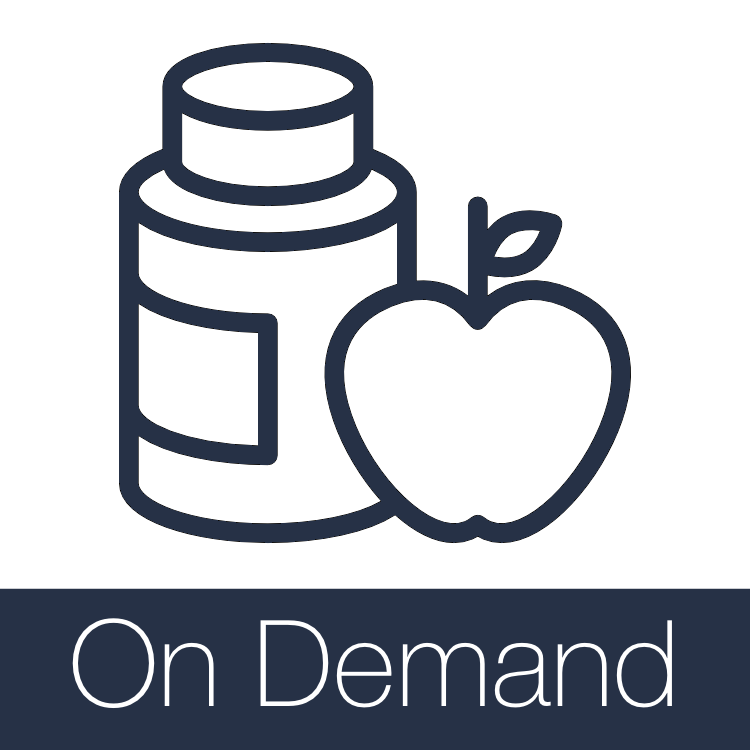Your cart is currently empty!
Functional Medicine for Pharmacists: Root Cause Approaches to Medication Therapy Management
This course, in collaboration between the Institute of Functional Medicine (IFM) and Functional Medicine CE (FxMedCE), offers a comprehensive training for pharmacists interested in applying Functional Medicine (FxMed) to their pharmacy practice. The course combines foundational concepts in FxMed assessment and plan design with medication management to equip pharmacists with the tools necessary to offer personalized, holistic care to their patients.
The course is composed of two parts:
- Part 1: Foundations in Functional Medicine
- Part 2: Medication Therapy Management (MTM) and Nutraceutical Management. (Note 3 hours of this content was a previous CE in July 2020)
In Foundations in Functional Medicine pharmacists are provided with an introduction to FxMed principles, enabling them to assess disease state status through a systems medicinelens. Pharmacists will learn to apply the principles of the Functional Medicine Matrix in assessing patients and designing personalized treatment plans. Through engaging modules presented by IFM faculty and case studies, participants will develop the skills necessary to apply root cause principles that promote holistic wellness.
In part two, pharmacists will delve into the intricate relationship between medications and nutrition status and how it impacts disease state and medication management. Through a series of modules, participants will explore topics such as drug-induced nutrient depletions (DIND), drug-nutrient interactions (DNI), and drug-herb interactions (DHI) using case-based learning. Pharmacists will learn how to apply a FxMed lens to medication therapy management and play an active role in patient nutraceutical management. Specifically tailored to address highly prescribed classes of medications including oral contraceptives, Proton Pump Inhibitors (PPIs), Statins, Nonsteroidal Anti-inflammatory Drugs (NSAIDs), and Selective Serotonin Reuptake Inhibitors (SSRIs), pharmacists will gain the knowledge and confidence to provide optimal support to their patients.
Pharmacists who complete this course will be equipped with the evidence-based training needed to optimize patient medication and nutraceutical therapy and play an essential role as part of the FxMed collaborative team. Several components of the IFM toolkit resources will also be provided to learners to allow them to implement concepts easily into practice.
CPE Course Details – Part 1 | CPE Course Details – Part 2 | CPE Course Details – Part 3
2 Hours
Introduction to Functional Medicine: Redefining Disease Applied Systems Medicine
By Mark Hyman, MD and Patrick Hanaway, MD
Functional Medicine is more than an alternative set of treatments for chronic disease: It is a philosophic and methodologic approach to medicine. Using tools that have been developed by IFM, we will discuss and outline the methodologic rationale for the Functional Medicine approach that sets us on the road to making real changes in our patients with chronic disease.
Learning Objectives
- Distinguish the key differences between conventional medicine and functional medicine.
- Clarify how a systems-based approach can effectively treat illness and promote wellness.
- Understand broadly how to apply concepts of patient-centered care for patients with chronic disease.
2 Hours
Mapping the Territory: Using the Functional Medicine Matrix Model
By Kristi Hughes, ND
Participants will be guided through a variety of exercises to help build an understanding of how to use the Functional Medicine Timeline and Matrix as well as solidify the concepts of Antecedents, Triggers, and Mediators. Participants will also focus on the “Assimilation Node” of the Functional Medicine Matrix in the introduction to the first educational case in which participants will explore irritable bowel syndrome (IBS) from a functional perspective.
Learning Objectives
- Understand and apply the Functional Medicine operating system and GOTOIT heuristic for patient management.
- Apply knowledge of antecedents, triggers, and mediators while gathering the medical history.
- Recognize the seven core clinical imbalances.
80 Minutes
Clinical Integration and the Functional Medicine Matrix
By Robert Luby, MD
A systems biology approach can provide an excellent tool in gaining insight into chronic disease. Within that framework, it must be understood that chronic diseases are entities as unique and diverse as those whose lives they affect. A single ‘diagnosis’ may, in fact, be due to a multitude of different etiologies, and those specific etiologies can vary from person to person. In this integration of the past 5 days, participants will explore the diagnosis of fatigue, how to frame that to the patient, and how to use the functional model in practical ways.
Learning Objectives
- Utilize IFM’s clinical tools that have been introduced at AFMCP
- Begin to effectively apply IFM’s GOTOIT methodology to patient care.
- Apply an optimal sequence of clinical interventions suited for clinicians new to functional medicine.
40 Minutes
Exploring the Scope of Practice for Pharmacists in Functional Medicine
By Melody Hartzler, PharmD
Learning Objectives
- Explore the role of pharmacists in healthcare and the evolving landscape of pharmacy practice.
- Discuss the integration of functional medicine principles into pharmacy practice.
- Outline the scope of practice for pharmacists in functional medicine, including patient assessment, treatment planning, education, and documentation.
- Identify challenges and opportunities for pharmacists practicing functional medicine, such as education/training needs, regulatory considerations, and integration into healthcare systems.
- Highlight case studies and success stories of pharmacists effectively practicing functional medicine.
3 Hours
Layering Functional Medicine into Medication Therapy Management
By Lauren Castle, PharmD, Melody Hartzler, PharmD, BCACP, BC-ADM, ABAAHP, and Lara Zakaria, PharmD, MS, CNS, CDN, IFMCP
The program will begin with a brief review of the current Medication Therapy Management (MTM) process, including billing and comparing MTM to other types of pharmacist provided services. The larger part of this section will demonstrate key functional medicine concepts that can be layered into MTM encounters.
Learning Objectives
- Explore the role of pharmacists in healthcare and the evolving landscape of pharmacy practice.
- Define, compare, and contrast medication therapy management (MTM) with comprehensive medication management (CMM) & disease state management (DSM).
- Review the pharmacists’ patient care process relative to delivering MTM within the functional medicine framework
- Demonstrate the impact of intestinal permeability and dysbiosis on cardiometabolic disease.
- Apply functional medicine concepts to MTM cardiometabolic patient cases
3 Hours
Clinical Opportunities for DIND & Nutraceutical Interactions: Defining Drug-Nutrient Interactions, Drug-Induced Nutrient Depletions, Drug-Herb Interactions
By Lara Zakaria, PharmD, MS, CNS, CDN, IFMCP
Learning Objectives
- Define basics of nutritional counseling and assessment in managing patients with chronic disease taking medications within the context of a functional medicine framework.
- Outline a holistic approach to medication management and define drug-nutrient interactions (DNI).
- Identify opportunities for nutritional supplementation to support patients taking
medications for chronic disease. - Describe drug-induced nutrient depletions (DIND) as part of medication management.
- Outline a holistic medication management approach that layers DNI considerations within the context of a functional medicine framework.
- Identify opportunities for leveraging foundational diet and lifestyle or supplementation to support patients taking medications
- Describe an evidence-based approach to disease-state and medication management that includes assessment of drug-herb interactions (DHI).
- Outline evidence for safe and effective herbal recommendations when appropriate in management of patients taking medications for chronic disease.
- Identify evidence-informed and safe opportunities for using nutraceuticals to minimize risks and side effects of medications when appropriate.
2 Hours
Maximizing Medication Efficacy Through Nutraceuticals
By Lara Zakaria, PharmD, MS, CNS, CDN, IFMCP
Learning Objectives
- Describe an evidence-based approach to disease-state and medication management that incorporates the concepts of DNI, DIND, and DHI using a case-based example.
- Outline a comprehensive medication management approach in oral contraceptives (OCPs), dyslipidemia, GERD, and depression with a functional medicine lens.
- Identify opportunities for integrating aspects of DNI, DHI, and DIND within the scope of practice of pharmacists using a FxMed lens for medication therapy management and working within a collaborative team to support evidence-based de-escalation.











